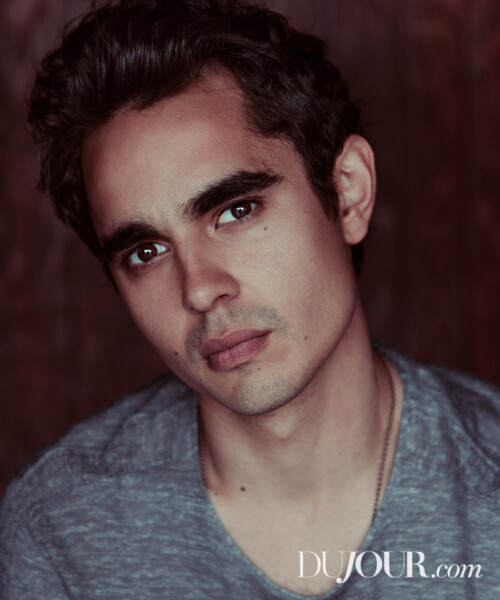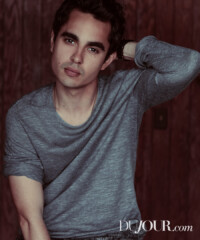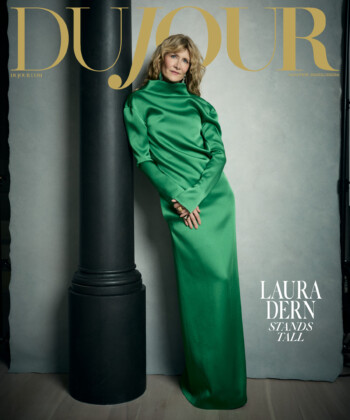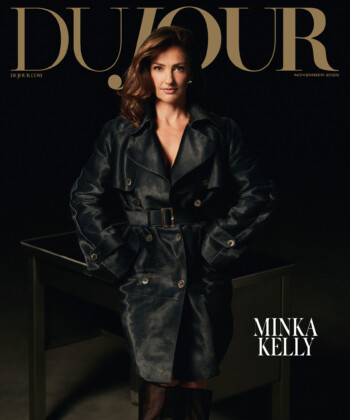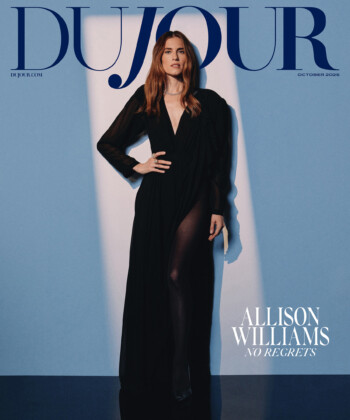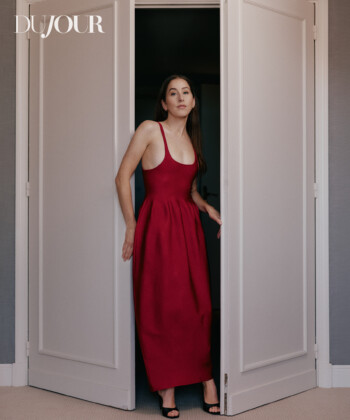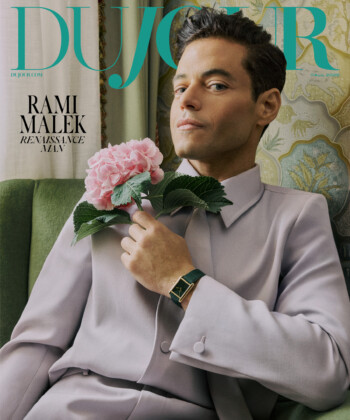Max Minghella is not famous. (Or so he says.) And yet, as he stands in the living room of a midcentury Los Angeles home before floor-to-ceiling windows that offer one of those only-in-L.A. panoramic views, all eyes are inevitably drawn to the 31-year-old actor. Camera-friendly features, including formidable untended brows (which he jokes he swiped from actress Lily Collins) and expressive dark brown eyes, have served him well thus far in his acting career—a vocation he initially hadn’t intended to pursue. “I really didn’t have any interest in being an actor at all,” Minghella admits, until one night in 2002 when he caught Jake Gyllenhaal in a performance of This Is Our Youth, Kenneth Lonergan’s lacerating play about disaffected wealthy teens. “That play changed my life in so, so many ways,” he remembers. “That was the singular thing that got me interested.”
Since making his big screen debut three years later, in 2005, Minghella’s been in constant demand. Yet despite significant roles in Oscar-winning prestige films such as Syriana and The Social Network, and a recurring part on the buzzy sitcom “The Mindy Project,” the London-born, Los Angeles-based actor continues to enjoy relative anonymity, regardless of having been a popular subject of photographers (thanks to his four-year relationship with actress Kate Mara) and his notable lineage: Minghella’s late father Anthony was a cinematic great who directed many award-winning films, including The English Patient and The Talented Mr. Ripley, and his sister Hannah is the president of TriStar Pictures. Their mother is accomplished choreographer Carolyn Choa.
“There is no fame, I’m serious,” Minghella states emphatically, before pausing to add, “Well, it’s very manageable.” Having witnessed firsthand the way actor-friends such as Jude Law and Matt Damon have had to contend with intrusive paparazzi, he hopes to keep it that way, even in the face of two forthcoming high profile, potentially career-changing projects that put him in front of, and behind, the camera. (In a way, it was Damon who helped Minghella expand the range of his career; during the filming of Ripley, in 1998, the actor gifted his director’s son with a Super-8 video camera as a 13th birthday present.)
Before he makes his directorial debut, however, Minghella will first take the small screen as a star of “The Handmaid’s Tale,” a television adaptation of Margaret Atwood’s prescient 1985 novel. The series, which also stars Elizabeth Moss and premieres on Hulu April 26, depicts a dystopian world of the future in which women are imprisoned and forced to procreate for the infertile wives of the ruling male elite. The continued relevance of Atwood’s story, which has already been adapted into a film, ballet and opera, isn’t lost on Minghella, who costars as Nick, a complex romantic character of dubious morality.
“I suppose it’s because there’s been some degree of oppression of women throughout history and that doesn’t seem to be going away,” Minghella suggests. “Aside from gender and equality, I think that any group that feels repressed or ostracized will find something that reflects the world and their political state.” Despite the story having been written more than three decades ago, it’s arguably more timely than ever. In January, a march for women’s equality attracted nearly three million participants around the globe, and in March, women clad in Handmaid-inspired red robes and white bonnets filed into a meeting of the Texas Senate to protest anti-abortion legislation. Minghella, who refers to himself as “the least political person in the world,” doesn’t want the politics of the storyline to overshadow its entertainment value as an effective chiller.
“It doesn’t feel like you’re being told off or are listening to a college lecture on feminism in the 20th century,” he insists. “It genuinely works as a fun TV show that just happens to be quite pertinent.” In fact, despite his aforementioned apolitical stance, serving a substantial female-driven story was part of the reason Minghella, who was in no rush to act again, signed for the series, which marks his first significant on-screen appearance in two years. “I find women on the whole to be much more compelling cinematic characters,” he discloses. “There seems to be much more going on with a woman than a man. Just from a very strategic cynical point of view, I’d rather watch a show that is driven by interesting complex women, rather than me.”
Later this year, Minghella will test that theory himself when he directs Teen Spirit, a pop musical starring Elle Fanning as a young woman determined to become a singing star. Minghella describes the script, based on a story he developed with best friend, actor Jamie Bell, as “not particularly highbrow or intellectual.” A self-described “pop culture and pop music whore,” he says that he wanted to make his directorial debut “something that was unadulterated to my taste,” adding, “My ambition is really to make something that feels cinematic and escapist.”
It’s a 180-degree turn from not only the universe he inhabits in “Handmaid’s Tale,” but also the sort of thought-provoking epics for which his father was famous. Minghella maintains this isn’t a conscious choice to distinguish his work from his dad’s. “I’m just more of a populist than he was,” he explains, adding that he’s his father’s biggest fan. “The thing I’ve noticed as I’ve gotten older is these films actually have sort of influenced me as a person and my psychology more than as a filmmaker and an actor,” he reveals. “It’s just literally living with certain worlds and ideas and dynamics during a fragile time in your youth.”
Although he may consider himself populist, Minghella admits that he’s very bad at socializing. That’s rather ironic news from a man whose arguably most famous film depicted the creation of Facebook. Social media is a very different story, he asserts. He’s active on Twitter, but keeps his Facebook and Instagram accounts private. “To me that feels like sacred territory that should be for friends and family only,” he declares. “I love that stuff way too much. I had to delete them both from my phone due to it becoming an addiction issue.”
Minghella says he’s good at hanging out in person if he can talk about work. “Most days I work on whatever nonsense I’m involved with then I walk and get coffee.” His local coffee shop, he claims, is the only place where people recognize him. “I love the familiarity of that, actually. I’m a sucker for them knowing my name and saying hi and having my order ready.” But if the buzz around his forthcoming projects is any indication, it won’t be long before more than just his barista will remember Minghella’s name.

























